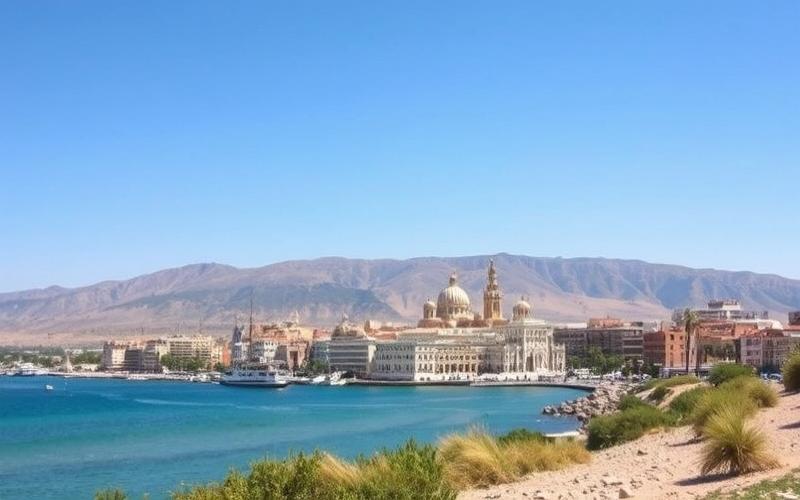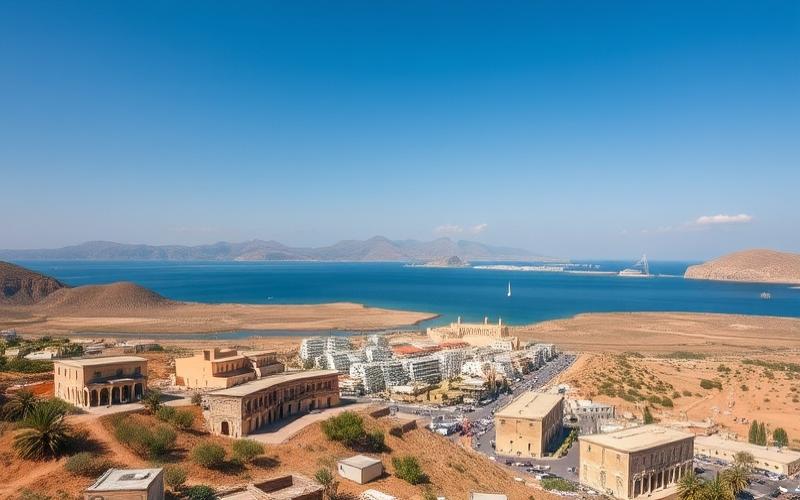
 Published on and written by Cyril Jarnias
Published on and written by Cyril Jarnias
Cyprus, the jewel of the Eastern Mediterranean, is attracting more and more expatriates seeking sun, quality of life, and economic opportunities. But beyond the fine sandy beaches and advantageous tax regime lie challenges to overcome. Let’s dive into the advantages and disadvantages of expatriating to Cyprus to help you decide if this destination is right for you.
A Tax Haven in the Heart of Europe
Cyprus has built a reputation as a tax haven within the European Union, attracting numerous entrepreneurs and investors. The 12.5% corporate tax rate is one of the lowest in Europe, offering a definite competitive advantage for businesses setting up there. But that’s not all: the country also offers attractive tax incentives for individuals.
The “non-domiciled” (non-dom) regime is particularly attractive for expatriates. For the first 17 years of residence, foreign-sourced income (dividends, interest, rental income) is completely tax-exempt. Furthermore, foreign retirees can opt for a 5% flat tax on their pensions, regardless of the amount. These tax advantages allow expatriates to keep a significant portion of their income, thereby increasing their purchasing power.
The island also benefits from an extensive network of tax treaties (over 60 countries), avoiding double taxation and facilitating international investments. For entrepreneurs, Cyprus offers privileged access to European markets while maintaining relatively low operational costs.
However, it should be noted that these tax advantages come with increasingly strict regulations. Cyprus has had to strengthen its controls and tax transparency due to international pressure. Reporting and compliance obligations (CRS, FATCA) are now rigorous, often requiring professional help to navigate this complex tax landscape.
Good to know:
While Cyprus’s tax advantages are undeniable, they come with increasing complexity. It is crucial to research thoroughly and consult experts to optimize your tax situation legally.
A Mediterranean Quality of Life at a Gentle Price
Beyond tax advantages, Cyprus captivates with its exceptional living environment. With over 320 sunny days per year, fine sandy beaches, and preserved nature, the island offers an idyllic environment for outdoor enthusiasts. Coastal cities like Limassol or Paphos combine Mediterranean charm with modern infrastructure, while the countryside is full of picturesque villages and fascinating archaeological sites.
The cost of living in Cyprus is generally lower than in many Western European countries, particularly regarding real estate. Rents are on average 30% cheaper than in France, allowing expatriates to enjoy spacious housing or a sea view for a reasonable budget. Food prices and local services are also competitive, although some imported products may be more expensive.
Safety is another major asset of Cyprus. The island has one of the lowest crime rates in Europe, offering valuable peace of mind for expatriate families. The education system offers quality international schools, although their fees can be high.
However, life in Cyprus is not without drawbacks. Summers can be extremely hot, with temperatures regularly exceeding 40°C. Water management is a constant challenge on the island, with frequent restrictions in summer. Moreover, despite progress made, public services and infrastructure can sometimes seem less developed than in other European countries, particularly regarding public transportation.
Good to know:
Cyprus offers excellent value for money in terms of living environment, but it’s important to carefully assess your housing, education, and service needs before settling.
A Changing Job Market: Opportunities and Challenges
The Cypriot economy has undergone a remarkable transformation in recent years, shifting from a model based on tourism and financial services to a more diversified economy. The technology, energy (especially with the discovery of natural gas fields), and real estate sectors offer new opportunities for skilled expatriates.
Cyprus’s status within the European Union greatly facilitates the settlement and work of European nationals. For non-Europeans, obtaining a work permit can be more complex, but the country has implemented programs to attract foreign talent, especially in sectors with a shortage of skilled labor.
Entrepreneurship is particularly encouraged in Cyprus. Setting up a business is relatively simple and quick, with simplified administrative procedures and an environment favorable to startups. The country has developed several incubators and accelerators to support innovation and technological entrepreneurship.
However, the Cypriot job market also presents challenges. The unemployment rate, although decreasing, remains above the European average (6.6% in 2024). Salaries, especially in the private sector, can be lower than in other European countries, although this is partly offset by a lower cost of living and advantageous taxation.
Proficiency in English is a major asset in the Cypriot job market, as the island is a former British colony. Greek is not essential in many sectors, but learning it can facilitate integration and open more professional opportunities.
Good to know:
Cyprus offers an environment conducive to entrepreneurship and opportunities in growing sectors, but it is crucial to carefully assess the job market in your field before expatriating.
Between Mediterranean Tradition and Modernity: The Challenge of Integration
Expatriating to Cyprus means immersing yourself in a rich and complex culture, at the crossroads of Greek, Turkish, and British influences. Cypriot hospitality is legendary, and many expatriates testify to the warmth and openness of the local people. Social life is vibrant, centered around cafes, taverns, and beaches, offering many opportunities for meetings and exchanges.
However, integration can present challenges. Cypriot society remains relatively traditional, especially outside major coastal cities. Family ties are very strong, and expatriates can sometimes feel excluded from certain social circles. The language barrier can also be an obstacle, although English is widely spoken in tourist areas and business circles.
The division of the island between the Republic of Cyprus (EU member) and the Turkish Republic of Northern Cyprus (recognized only by Turkey) adds a geopolitical complexity that expatriates must adapt to. Although the situation is stable, this division influences daily life and travel on the island.
Adapting to the Mediterranean pace of life can be both a pleasure and a challenge. Work hours can be different, with a long lunch break and days ending later. The concept of time is more flexible than in Northern Europe, which can be a source of frustration for some expatriates accustomed to strict punctuality.
Culturally, Cyprus offers a dynamic arts scene, blending local traditions and international influences. Festivals, concerts, and exhibitions are numerous, especially during the summer season. However, the cultural offerings may seem limited compared to major European capitals, especially in winter.
Good to know:
Integration in Cyprus requires an open mind and a willingness to adapt to a Mediterranean lifestyle. Participating in local activities and learning some Greek basics can greatly facilitate this process.
Health and Well-being: Between Sun and Challenges
Cyprus’s Mediterranean climate is often cited as a well-being factor by expatriates. The abundance of sunshine and the possibility of practicing outdoor activities year-round contribute to a healthy lifestyle. The Mediterranean diet, rich in fruits, vegetables, and olive oil, is also recognized for its health benefits.
In terms of medical care, Cyprus has significantly improved its healthcare system in recent years. The country introduced a new national health system, GESY (General Healthcare System), in 2019, offering universal coverage. Resident expatriates can benefit from this system by making monthly contributions, giving them access to quality care at reduced costs.
However, the public healthcare system can sometimes face significant wait times for certain specialized treatments. Many expatriates therefore choose to combine GESY coverage with private health insurance to benefit from faster access to care and greater flexibility in choosing practitioners.
The quality of medical care is generally good, especially in major cities like Nicosia and Limassol. Many doctors were trained abroad and speak English, which facilitates communication for expatriates. However, for some highly specialized treatments, it may be necessary to go abroad.
A particular challenge in Cyprus concerns managing heat stress during the summer months. High temperatures can be taxing, especially for the elderly or those with pre-existing health conditions. It is crucial to adopt good practices to protect yourself from the sun and stay hydrated.
Air pollution can also be a problem in certain urban areas, especially due to sandstorms from the Sahara. People with allergies or respiratory issues must be vigilant and may need to take additional precautions.
Good to know:
The Cypriot healthcare system offers good coverage, but combining GESY and private insurance is recommended for optimal protection. Adapting to the hot climate requires precautions, especially for sensitive individuals.
Education and Training: Between Tradition and Innovation
For expatriate families, children’s education is often a major concern. Cyprus offers a diverse educational system, with public and private options, as well as international schools.
The Cypriot public education system is free and compulsory from ages 5 to 15. Teaching is primarily in Greek, which can be a challenge for expatriate children who do not master the language. However, English learning is mandatory from primary school, and many schools offer support programs for non-Greek-speaking students.
For families wanting continuity with their home country’s educational system or English-language instruction, Cyprus has several reputable international schools, particularly in Nicosia, Limassol, and Paphos. These schools generally follow British, American, or International Baccalaureate programs. However, tuition fees can be high, representing a significant investment for families.
Higher education in Cyprus has seen significant development in recent years. The University of Cyprus, founded in 1989, now appears in international rankings. Moreover, several foreign universities have established campuses on the island, offering programs in English. This internationalization of higher education attracts more and more foreign students, contributing to the island’s cultural diversity.
For adult expatriates, Cyprus offers many opportunities for continuing education and professional development. Greek language courses are widely available and often subsidized for residents. Furthermore, the country has developed online training offerings and evening courses to facilitate lifelong learning.
An interesting aspect of the Cypriot education system is its growing commitment to innovation and technology. The government has launched several initiatives to promote STEM education (Science, Technology, Engineering, and Mathematics) and entrepreneurship from a young age. This approach aims to prepare young generations for the challenges of the future job market.
Good to know:
Cyprus offers a varied choice of educational options, from public schools to international institutions. Investment in education can be substantial, but the quality of teaching is generally good, with an increasing focus on innovation.
Housing and Real Estate: Between Opportunities and Precautions
The Cypriot real estate market offers many opportunities for expatriates, whether for renting or buying. Real estate prices in Cyprus remain attractive compared to other popular Mediterranean destinations, although they have risen in recent years, especially in sought-after coastal areas.
For tenants, the market offers a wide variety of properties, from modern apartments in city centers to villas with pools by the sea. Rents are generally more affordable than in many major European cities, allowing expatriates to enjoy better value for money. However, it’s important to note that prices can vary considerably depending on the season, especially in tourist areas.
Buying property in Cyprus can be an interesting option for expatriates considering a long-term stay. The purchasing process is relatively simple for EU nationals, who enjoy the same rights as Cypriots. For non-Europeans, purchase is also possible but subject to certain restrictions and obtaining government approval.
It is crucial to exercise caution when buying property in Cyprus. The country has experienced problems related to property titles in the past, especially in certain areas of rapid development. It is highly recommended to hire an independent lawyer and conduct thorough checks before any transaction.
The Cypriot real estate market has been boosted in recent years by investment programs, notably the “Golden Visa” which offered citizenship in exchange for significant real estate investments. Although this program was suspended in 2020 following controversies, it helped stimulate the construction sector and modernize the real estate offering in certain regions.
An aspect for expatriates to consider is the energy efficiency of housing. Many older constructions may lack insulation, which can lead to high air conditioning costs in summer and heating costs in winter. Recent constructions tend to be more compliant with modern energy standards.
Good to know:
The Cypriot real estate market offers interesting opportunities, but it is essential to research thoroughly and use local professionals to secure any transaction. Renting can be a more flexible option for short- or medium-term expatriates.
Conclusion: Cyprus, an Expatriation Destination to Consider Carefully
Expatriating to Cyprus presents many advantages: an enviable Mediterranean climate, attractive taxation, a relatively affordable cost of living, and an appreciable quality of life. The island offers a unique blend of Mediterranean culture and modern infrastructure, all in an exceptional natural setting.
However, like any expatriation destination, Cyprus also has its challenges. Cultural adaptation, the language barrier in certain contexts, and the need to navigate a sometimes complex administrative system can represent obstacles. Moreover, some sectors of the job market may be limited, and salaries are not always competitive compared to other European countries.
The key to a successful expatriation in Cyprus lies in meticulous preparation and a clear understanding of your personal and professional goals. It is crucial to carefully assess your financial situation, career prospects, and quality of life expectations before making the leap.
For those seeking a change of pace, advantageous taxation, and a sunny living environment, Cyprus can offer a rewarding expatriation experience. The island is particularly attractive for entrepreneurs, retirees, and digital professionals seeking a balance between professional and personal life.
Ultimately, Cyprus is a destination worth seriously considering for expatriation, provided you approach this project with realism and good preparation. The island offers definite potential for those ready to embrace its unique lifestyle and meet the accompanying challenges.
Disclaimer: The information provided on this website is for informational purposes only and does not constitute financial, legal, or professional advice. We encourage you to consult qualified experts before making any investment, real estate, or expatriation decisions. Although we strive to maintain up-to-date and accurate information, we do not guarantee the completeness, accuracy, or timeliness of the proposed content. As investment and expatriation involve risks, we disclaim any liability for potential losses or damages arising from the use of this site. Your use of this site confirms your acceptance of these terms and your understanding of the associated risks.



























